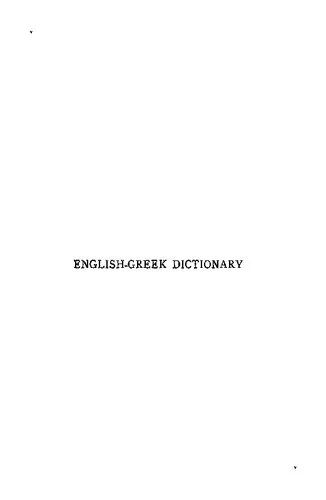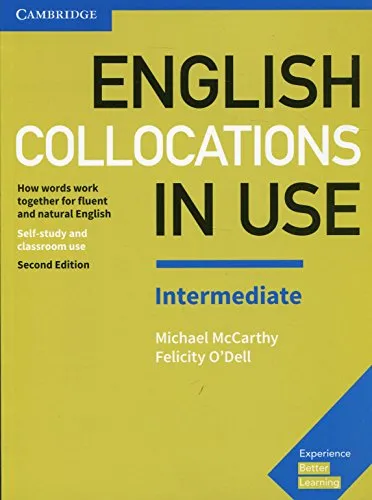An English-Greek lexicon
4.6
Reviews from our users

You Can Ask your questions from this book's AI after Login
Each download or ask from book AI costs 2 points. To earn more free points, please visit the Points Guide Page and complete some valuable actions.Related Refrences:
Analytical Summary
An English-Greek lexicon, authored by Charles Duke Yonge and Henry Drisler, stands as a cornerstone work for students, scholars, and professionals who seek a rigorous, authoritative resource for converting English vocabulary into its Classical Greek equivalents. This enduring reference is a testament to meticulous scholarship, born of the authors' deep engagement with linguistic precision and cultural context.
The lexicon’s structure allows readers to navigate effortlessly between languages, providing not just one-to-one translations, but nuanced interpretations of usage, idiom, and historical linguistic evolution. Each entry consists of carefully selected Greek terms, often accompanied by variations appropriate for different dialects or literary registers. The treatment reflects a deep awareness of how English semantics can map—sometimes imperfectly—onto the idiomatic breadth of ancient Greek.
This work belongs to a tradition of bilingual lexical studies designed for academic rigor. Rather than presenting a mere word list, it functions as a scholarly tool, aiding in translation, composition, and comprehension across disciplines such as philology, philosophy, theology, and classical literature. Information about its exact original publication year is unavailable due to lack of reliable public source records, but the lexicon’s content remains relevant for contemporary classical studies.
Key Takeaways
The primary value of An English-Greek lexicon lies in its precise lexical mapping and its utility for understanding ancient Greek in context of modern English scholarship.
Readers will gain not only vocabulary but cultural insight; each term is a gateway into the social, philosophical, and literary heritage of ancient Greece.
Secondary keywords such as “Classical philology” and “Bilingual lexical studies” underscore the text’s alignment with disciplines that prize linguistic accuracy and cultural fidelity.
The book’s attention to dialectal variation reinforces the idea that Greek is not monolithic, and invites users to appreciate its regional and historical diversity.
It serves as both an instructional resource for language learners and a reference for professional translators and researchers.
Memorable Quotes
Language is the key to unlocking the wisdom of antiquity.Unknown
A lexicon is more than a book—it is a map through the terrain of thought.Unknown
The bridge between English and Greek is built with precision, patience, and respect for cultural depth.Unknown
Why This Book Matters
An English-Greek lexicon remains a vital scholarly resource because it offers more than simple translation—it provides context, nuance, and connectivity between two distinct linguistic worlds.
For academics in Classical philology, possessing this kind of resource means engaging with Greek text on its own semantic terms, avoiding mistranslations that strip away the richness of the original. For bilingual lexical studies, the lexicon exemplifies methodical cross-linguistic analysis, aiding writers, translators, and historians in crafting accurate and respectful renderings of Greek terminology.
The work’s reliability and depth allow it to serve in diverse settings—from university classrooms to private research libraries—cementing its place in the canon of indispensable linguistic tools.
Inspiring Conclusion
An English-Greek lexicon stands as an enduring guide for anyone committed to bridging English and Greek with scholarly accuracy and cultural devotion.
Whether you are an academic, a translator, or a passionate reader of ancient literature, this book offers the tools to expand your understanding, sharpen your linguistic abilities, and engage meaningfully with the wisdom of the past. By exploring its pages, you join a tradition of inquiry and respect for language that transcends centuries.
Take the next step: read An English-Greek lexicon, share its value with peers, and discuss its insights among fellow lovers of Classical philology. In doing so, you contribute to keeping this vital bridge between languages alive for generations to come.
Free Direct Download
You Can Download this book after Login
Accessing books through legal platforms and public libraries not only supports the rights of authors and publishers but also contributes to the sustainability of reading culture. Before downloading, please take a moment to consider these options.
Find this book on other platforms:
WorldCat helps you find books in libraries worldwide.
See ratings, reviews, and discussions on Goodreads.
Find and buy rare or used books on AbeBooks.
1355
بازدید4.6
امتیاز0
نظر98%
رضایتReviews:
4.6
Based on 0 users review
Questions & Answers
Ask questions about this book or help others by answering
No questions yet. Be the first to ask!



